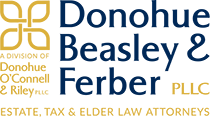As the year draws to a close and the festive spirit ushers in a time of reflection and anticipation, there’s no better moment to review and refresh your elder law preparations. The transition from one year to the next presents a unique opportunity not only to reflect on the changes and achievements of the past months but also to proactively prepare for the future. This is particularly true when it comes to elder law matters, which encompass a wide range of important decisions, from estate planning to healthcare directives.
Year-End Review: Estate Plan Essentials
The end of the year is an opportune time to revisit your estate plan. An effective estate plan is not a one-time affair; it’s a dynamic set of documents that should evolve with your life’s changes. Here are critical elements to consider:
- Will and Trusts: Verify that your will is up to date with your current wishes, beneficiaries are still aligned with your intentions, and any trusts you have established are funded and reflect any changes in your financial or family situation.
- Powers of Attorney: Review who you have designated as your attorney-in-fact for financial and healthcare decisions. Ensure these individuals are still capable and willing to serve in these roles.
- Healthcare Directives: Review your living will and healthcare proxy to ensure they reflect your current healthcare preferences and the contact information for your healthcare representative is current.
- Beneficiary Designations: Revisit beneficiary designations on life insurance policies, retirement accounts, and other financial assets to ensure they are consistent with your estate planning goals.
Proactive Planning: Looking Ahead
With the new year comes the chance to address new challenges and opportunities. Consider these steps as you look to the future:
- Asset Protection: Discuss with an elder law attorney about asset protection strategies to safeguard your estate against potential long-term care costs or unforeseen liabilities.
- Long-Term Care Planning: Review your current long-term care insurance policy or explore options if you do not have one. Consider how changes in health or mobility may affect your living arrangements and care needs.
- Charitable Contributions: If charitable giving is part of your legacy, the end of one year and the start of another is a great time to plan for philanthropic gifts, which can also offer tax advantages.
Updating Documents and Policies
The passage of time can bring significant changes to your personal circumstances. It’s vital to ensure all legal documents and policies reflect your current situation and the laws as they stand at the year’s end. Here’s what should be on your checklist:
- Document Accessibility: Ensure your important documents, such as your will, trust, powers of attorney, and healthcare directives, are stored safely but are accessible to those who may need them.
- Policy Reviews: Life insurance, annuities, and long-term care policies should be reviewed annually. Make sure premiums are up to date and coverage is adequate, adjusting as necessary for changes in your life and health.
Family Conversations: The Heart of Planning
The holiday season often brings families together, which is the perfect time for important conversations. Discussing your wishes and plans can be a gift in itself, offering peace of mind to you and your loved ones. Here’s how to approach this:
- Initiate the Conversation: Use the gathering of family members to express your wishes and listen to concerns. A calm and collected discussion can help prevent misunderstandings in the future.
- Share Your Vision: Clarify your healthcare preferences and the reasons behind your estate planning decisions. This transparency can help to ensure that your wishes are honored.
Looking Forward: Embracing the Future
As the new year approaches, so does the opportunity for fresh starts and renewed focus. Look ahead with these considerations:
- Tax Planning: Work with a financial advisor or accountant to understand any changes in tax laws that may impact your estate or income tax situation in the coming year.
- Charitable Strategies: If you’re planning to increase your charitable giving, consider speaking with your attorney about incorporating charitable trusts or donor-advised funds into your estate plan.
Remember, the start of a new year is also a reminder of the importance of flexibility and adaptability in your planning. Laws change, family dynamics shift, and your own goals and needs can evolve. An annual check-in with your elder law attorney can ensure that your plans remain robust and reflective of your current intentions.
Your Next Steps
Whether you’re looking back on a year of changes or looking forward to the promise of a new year, taking the time to review and update your elder law matters is essential. By making sure your estate plan and healthcare directives reflect your current wishes, discussing your plans with your family, and staying informed about legal and financial changes, you can feel confident and secure in your future and that of your loved ones.
As the new year rings in, let it bring not just resolutions but real, actionable steps towards securing your legacy and ensuring your wishes are fulfilled. At Beasley & Ferber, we understand the importance of family, legacy, and peace of mind. Our team is ready to guide you through each step of your elder law planning. Contact us to schedule a consultation and start the new year with confidence in your elder law preparations.





